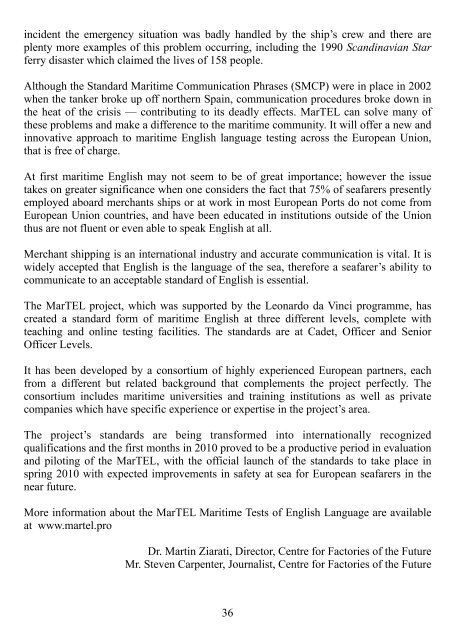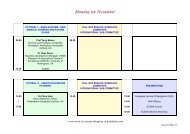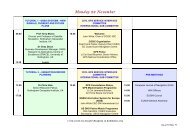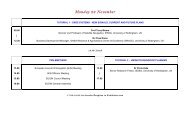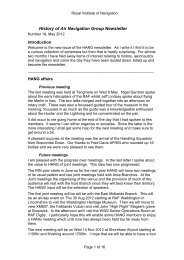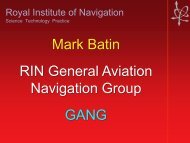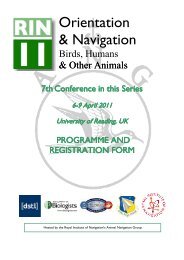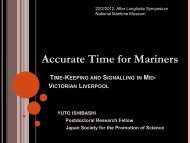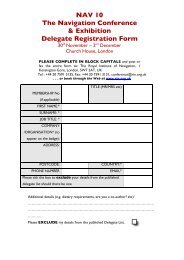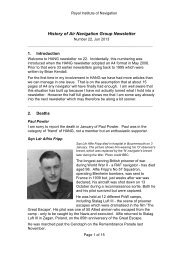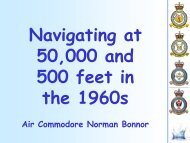Fairway 30 - Royal Institute of Navigation
Fairway 30 - Royal Institute of Navigation
Fairway 30 - Royal Institute of Navigation
You also want an ePaper? Increase the reach of your titles
YUMPU automatically turns print PDFs into web optimized ePapers that Google loves.
incident the emergency situation was badly handled by the ship’s crew and there are<br />
plenty more examples <strong>of</strong> this problem occurring, including the 1990 Scandinavian Star<br />
ferry disaster which claimed the lives <strong>of</strong> 158 people.<br />
Although the Standard Maritime Communication Phrases (SMCP) were in place in 2002<br />
when the tanker broke up <strong>of</strong>f northern Spain, communication procedures broke down in<br />
the heat <strong>of</strong> the crisis — contributing to its deadly effects. MarTEL can solve many <strong>of</strong><br />
these problems and make a difference to the maritime community. It will <strong>of</strong>fer a new and<br />
innovative approach to maritime English language testing across the European Union,<br />
that is free <strong>of</strong> charge.<br />
At first maritime English may not seem to be <strong>of</strong> great importance; however the issue<br />
takes on greater significance when one considers the fact that 75% <strong>of</strong> seafarers presently<br />
employed aboard merchants ships or at work in most European Ports do not come from<br />
European Union countries, and have been educated in institutions outside <strong>of</strong> the Union<br />
thus are not fluent or even able to speak English at all.<br />
Merchant shipping is an international industry and accurate communication is vital. It is<br />
widely accepted that English is the language <strong>of</strong> the sea, therefore a seafarer’s ability to<br />
communicate to an acceptable standard <strong>of</strong> English is essential.<br />
The MarTEL project, which was supported by the Leonardo da Vinci programme, has<br />
created a standard form <strong>of</strong> maritime English at three different levels, complete with<br />
teaching and online testing facilities. The standards are at Cadet, Officer and Senior<br />
Officer Levels.<br />
It has been developed by a consortium <strong>of</strong> highly experienced European partners, each<br />
from a different but related background that complements the project perfectly. The<br />
consortium includes maritime universities and training institutions as well as private<br />
companies which have specific experience or expertise in the project’s area.<br />
The project’s standards are being transformed into internationally recognized<br />
qualifications and the first months in 2010 proved to be a productive period in evaluation<br />
and piloting <strong>of</strong> the MarTEL, with the <strong>of</strong>ficial launch <strong>of</strong> the standards to take place in<br />
spring 2010 with expected improvements in safety at sea for European seafarers in the<br />
near future.<br />
More information about the MarTEL Maritime Tests <strong>of</strong> English Language are available<br />
at www.martel.pro<br />
Dr. Martin Ziarati, Director, Centre for Factories <strong>of</strong> the Future<br />
Mr. Steven Carpenter, Journalist, Centre for Factories <strong>of</strong> the Future<br />
36


